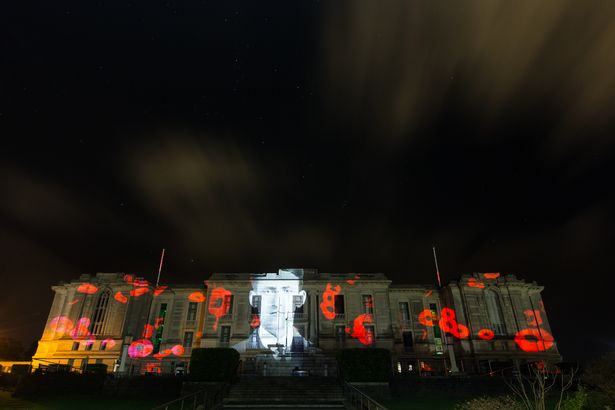Welsh poet Hedd Wyn image beamed on National Library of Wales
A video installation called Y Milwr Amharod (The Reluctant Soldier) has been beamed on to the front of the National Library of Wales (Llyfrgell Genedlaethol Cymru). It commemorates the 100th anniversary of the death of Welsh war poet Hedd Wynn, the Snowdonia shepherd who was killed on the opening day of the Battle of Passchendaele in 1917, just days after being sent to the front line. Only weeks later, on 6 September 1917, at the National Eisteddfod Chairing of the Bard ceremony the winning poem was named as Yr Arwr (The Hero), written by Hedd Wyn under the nom-de-plume Fleur-de-Lis.
Hedd Wyn wrote several war poems following the outbreak of the first world war in 1914. He was a Christian pacifist and at first did not enlist for the war, believing he could never kill anyone. Although resistant to enlisting, by 1916 the family were told that they had to send one of their sons to join the British Army. Hedd Wyn enlisted rather than having to see his younger brother Robert sent to war. Like 280,000 other Welshmen he was conscripted to fight in the first world war.
The conflict inspired a number of his poems including, Rhyfel ("War"):
Gwae fi fy myw mewn oes mor ddreng,
A Duw ar drai ar orwel pell;
O'i ôl mae dyn, yn deyrn a gwreng,
Yn codi ei awdurdod hell.
Pan deimlodd fyned ymaith Dduw
Cyfododd gledd i ladd ei frawd;
Mae sŵn yr ymladd ar ein clyw,
A'i gysgod ar fythynnod tlawd.
Mae'r hen delynau genid gynt,
Ynghrog ar gangau'r helyg draw,
A gwaedd y bechgyn lond y gwynt,
A'u gwaed yn gymysg efo'r glaw
Why must I live in this grim age,
When, to a far horizon, God
Has ebbed away, and man, with rage,
Now wields the sceptre and the rod?
Man raised his sword, once God had gone,
To slay his brother, and the roar
Of battlefields now casts upon
Our homes the shadow of the war.
The harps to which we sang are hung,
On willow boughs, and their refrain
Drowned by the anguish of the young
Whose blood is mingled with the rain.






